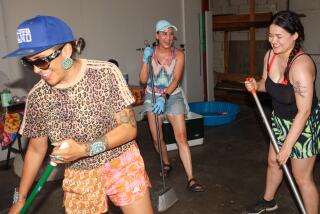Through Thick and Thin, Their Ties Endure
- Share via
In the midst of the Great Depression, the YMCA offered programs to get kids off the streets, offering them organized sports and activities to keep them occupied and out of trouble.
One of those groups was the Friendly Indians, begun in 1925 in southwest Los Angeles as a club for 9- to 12-year-olds. On Tuesday, 14 of its members held their annual reunion at a Lake San Marcos home, marking the 65th anniversary of the club’s founding.
“When we were young, the group gave us a sense of identity,” said Lloyd Olson, one of the members who now lives in the Los Angeles suburb of Rolling Hills. “It was like the gangs today, except we had an exceptional leader that kept us out of trouble.”
Over the years, the club evolved into a core group of 25 high school boys, its name changed to Alpha Kappa Alpha in keeping with the tradition of university fraternities.
Several of the club members came to the group after losing their fathers in World War I.
“For many of us (who) didn’t have fathers, this was our family,” said Lloyd Anderson, whose father died during the Great War. “We served each other in that capacity. The fact that the wives all got along helped keep us together, too.”
Although World War II sent the men on their separate ways--all of them serving in either the Army or Navy--they kept in touch with the help of a monthly newsletter, the AKA Scandal Sheet, published by a member’s father.
After the war--with three Purple Hearts but no casualties among them--most members stayed in the Southwest, and many return for Christmas and Easter reunions.
They have met each year since 1946 without interruption, despite deaths and separations.
“These guys are closer than brothers,” said Olson’s wife, Virginia. “If any of them had any troubles, these guys hung together and saw him through it.”
Aside from the original Friendly Indians, there were no particular events that formed the ties binding these men. Rather, the circumstances that brought them together as Depression-era children keep them together as adults.
With most of them retired and in their 70s, the men still manage to gather every Easter, usually with children, grandchildren and great-grandchildren in tow, to reopen scrapbooks filled with black-and-white photographs and newspaper clippings.
“These reunions become more and more important to us,” said Harold Mantle. “As people become infirmed and lose a mate, they need the spirit and consolation of the group.”
He added: “When one of us (dies), you begin to feel the realities of life. As we get older, we begin to treasure the friendship that we didn’t pay much attention to when we were younger.”
More to Read
Sign up for Essential California
The most important California stories and recommendations in your inbox every morning.
You may occasionally receive promotional content from the Los Angeles Times.













